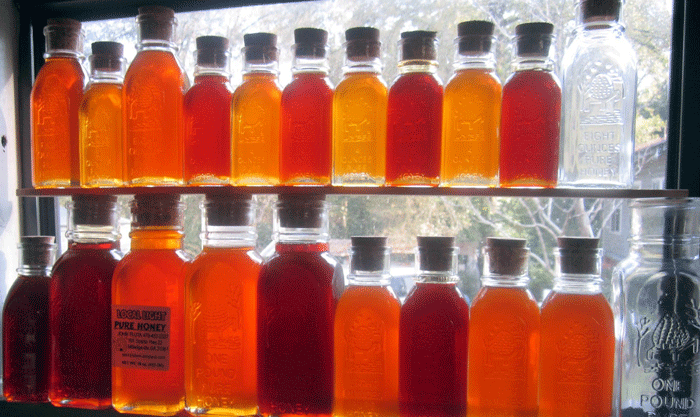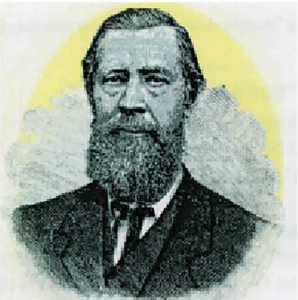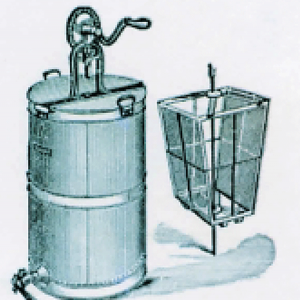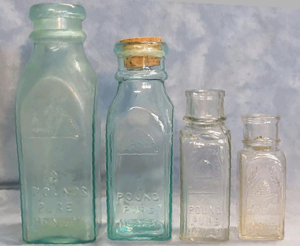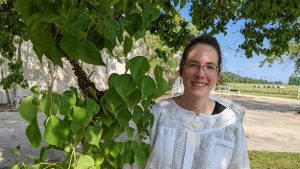By: Jim Thompson
The first jar invented specifically for honey.
I collect old honey jars and when I heard that the Muth Jar was the first jar to have been specifically made for honey, I had to check dates, because there were several bottles that were made for honey around the time that the Muth jar came on the scene in America. From this start, a colorful history emerged.
The one pound Muth jar is a square jar that is 6½” tall. Traditionally this type of jar was used for pickles and horseradish. Many people used a jar of this type only with the embossing of their names, so what makes it a Muth jar is the embossing of the beekeeping scene on the bottle. Therefore I will be looking at the bottles or jars from six producers or people that produced honey.
Charles F. Muth was born in Germany, April 23, 1834 to Charles F. and Carolina (Schmith) Muth. He had a brother August and a sister Carolina. August passed away in 1890 and by 1894 Carolina had married Ernest Oberheu of the Eagle Insurance Company in Cincinnati.
Charles was educated in Germany and at the age of nineteen (1853) he arrived in Cincinnati. There he clerked for three years in the grocery of S.H. Frank at the corner of Vine and Canal streets. He spent a few years in Minnesota and Kansas, engaged principally in land speculation. Upon his return to Cincinnati (1860), he established a grocery until 1883. The grocery store changed and carried the name Charles F. Muth & Sons, dealers in seeds, honey, beeswax and apiarian supplies.
In July, 1857, Charles married Carolina Muth. She was from another Muth family that were bakers by trade and also lived in Cincinnati. Charles and Carolina were the parents of ten children. The six children living in 1894 were: August J., who married Annie Nickel, and was associated in business with his father; Carolina, who married Louis W. Sauer, druggist; Henry E., who also associated with his father; Fred W., Stella, and Nellie.
During his 15 years as a beekeeper, Charles invented or improved many beekeeping items. Only one of the items was patented so the other items have been gleaned from literature.
Muth Honey Extractor – a two frame extractor with a tapered basket was granted Patent 208,327 on September 24, 1878 and featured a crank high above the top of the extractor, a honey reservoir and a honey gate.
Muth Honey Knife – looked very much like the standard cold Bingham uncapping knife.
Muth Cold Blast Smoker was mentioned in Gleanings on page 190, March 1, 1886. It was a smoker having bellows made of tin. So the smoker was all tin except the leather. He called this smoker the “Perfection.” It also had a valve in the bent air-tube, to prevent the smoke from being drawn back into the bellows. Another addition was a muzzle feeder, somewhat like the style on the Bingham’s and the extra covering on the fire pot to prevent burned fingers.
Muth Wax Extractor – one report was that there was a Muth wax extractor, but I couldn’t find it.
Muth Honey Jars – Since square jars were listed in the Root catalog in 1879 and the name of the grocery store changed in 1883, the earliest muth jars were made between 1879 to 1883. There were only a few glass companies at this time that made the square “pickle and horseradish” jars. They were Illinois Glass of Alton, Illinois, K.G.B. in Steubenville, Ohio, Whitall Tatum & Co. of Millville, N.J., and a couple of unlisted manufacturers such as” Z” and “C.C.S.”
In business, Charles was a very fair man as shown by three examples.
He had made an agreement with Oluf Olson, a southern beekeeper to purchase his honey at eight cents a pound. Upon receiving the honey, Charles found it to be of exceptional quality, that he told Mr. Olson that he was increasing the payment rate to ten cents a pound.
A woman going home to Lexington, KY from a National Bee Convention found herself stranded in Cincinnati because she had been transferred to the wrong depot. When Charles Muth found out about it, he opened his house to her and she was shown the work that was being done at the Lutheran Orphans’ Home the next day.
You will read about Charles thinking of Max Talbert’s order and making sure that everything was fair, while he was considering suicide.
Sometimes journalists embellish their articles, write articles without checking the facts or checking the spelling of names, putting in items that should have been left out, and not reading their own articles to proof them as there are a couple of things that are repeated. An example of this can be seen in the following article that appeared in the Cincinnati Enquirer (Cincinnati, Ohio) – Tuesday, May 17, 1898, page 12. So read the following obituary with a forgiving heart.
RIFLE
Ball Ended His Life
Tragic Death in Indiana of Charles F. Muth.
Wrote a Letter and Then Killed Himself.
Suffered From an Illness Resulting From Sunstroke.
His Property in This City Heavily Mortgaged, as Was His Farm, Where He Died.
Charles Frederick Muth, a prominent German Citizen and member of the Hamilton County Board of Control, committed suicide on his farm near Morristown, Ind., sometime between Sunday night and yesterday morning by shooting himself through the head. The news of his tragic end was a shock to his family, friends and acquaintances. He was reputed to be wealthy, his family relations were pleasant and there was apparently no cause which would drive a man of his standing to such a desperate deed.
Mr. Muth attended the meeting of the Board of Control at the courthouse last Tuesday afternoon. He took a lively interest in all of the proceedings, and seemed in good spirits. He said, however, that he was not feeling very well, and complained of pains in his head and back. The latter part of the week he announced to his family that he was going to visit his six-hundred-acre farm near Morristown. He was not feeling well then, but insisted upon going and went. On Saturday he telegraphed his family that he would be home Monday. The telegram was prophetic in a way. He arrived here last night a corpse.
On the farm is a house in which Mr. Muth stayed during his frequent visits. One of the rooms he had fitted cozily as a bed chamber for himself. About 7:30 o’clock yesterday morning James Wilkins entered Mr. Muth’s sleeping apartment to call him, and was horrified with what he saw. Mr. Muth was stretched across the bed with his legs hanging over the side and his feet touching the floor.
Between his knees was a thirty-two caliber rifle, the muzzle still pointing upward at an angle, Just under the chin near the right side was a ghastly wound from which the blood was still flowing. Wilkins found that the body was warm and ran for assistance. A thorough examination, however showed that life was extinct. The bullet from the rifle had passed through the base of the brain. Death must have been instantaneous, so that the deed was committed shortly before the body was found. There were no powder stains about the wound, and this fact at first aroused a suspicion that there had been foul play, but later the conclusion was reached that it was a clear case of suicide. Mr. Muth was fully dressed when found with the exception of his coat.
He had evidently shot himself while sitting upon the side of the bed and had then fallen back to die.
All Sunday Mr. Muth complained of severe pains in his head, and seemed to be morose, a condition which was unusual for him. The employees at the farm noted this and remarked about it. When the Coroner arrived upon the scene he made a discovery which explained everything. It was a letter left by the dead man. It was apparently from this that he had made up his mind to die, and had probably come to the farm, which he loved, to bid farewell to life. He had prepared himself for the end, and had then set himself about writing the last letter which his hand was to pen. It was in three sections, and there had probably elapsed considerable time between the writing of each. The dawn was just breaking when the shot was fired which ushered him into eternity.
The letter which he left was written on a business tablet, and was found lying on a desk near the bed. It was as follows:
“If I should die on my farm it is my wish that I be buried in the same graveyard with August Muller, and in the same simple manner. My family will respect my last wish. My honest debts must be paid.”
Charles F. Muth
“If my Masonic brethren of Morristown would do me the last honor it would be to me a consolation. I have always been worthy as a man or Mason to the best of my ability.
Charles F. Muth
Morristown, Ind.
May 15, 1898
“I have mailed home on Saturday the order of Max Talbert and his check for $24.00. His order will be filled on Monday or his check returned.”
Muller, whose name is mentioned in the letter, was the dead man’s uncle, and was buried in a neglected country graveyard, just west of the farm. Talbert is a wealthy farmer, living southeast of Morristown and he and Mr. Muth had many business transactions.
The suicide adds one more to the tragic deaths which have occurred on this farm. There had been five violent deaths previous to this, two suicides, two murders and one accidental shooting. Beyond the letter nothing was found in the dead man’s room which could throw any more light upon the deed. The safe was locked and could not be opened.
The news of Mr. Muth’s death by suicide was at first discredited in this city, as there was apparently no motive for the deed. About 14 years ago he suffered a sunstroke, and later a second one. These strokes affected his health, and the general opinion seems to be that his mind was temporarily deranged when he took his life. Business reverses may have had something to do with it. He and his son were in the honey and seed business on Central avenue near Freeman, and he owned the building in which the store was located. It could not be learned positively, but it is understood, that the farm in Morristown is mortgaged for an amount somewhere between $12,000 and $18,000. It is said to be worth $35,000. He had been trying for years to sell it, but was unable to get his price, which was $38,000. It is thought that the land could not be sold by him upon account of the wording of the will by which he inherited it, but it was impossible yesterday to get at the Court records so as to substantiate this. On a portion of the farm was Blue River Park, which he leased to A RAILWAY COMPANY.
An investigation show that the dead man’s real estate in this city was heavily mortgaged. He owned the big building in which he had his store on the south side of Capital avenue near Freeman. This was mortgaged on August 10, 1892 for $10,000 to the Butchers and Drover’s Building and Savings Company. The mortgage has not been canceled.
He and his wife owned a piece of property on Central avenue, southeast of the old Brighton House. This was mortgaged on February 12, 1890, to the Brighton Hall Building and Savings Company for $10,000, and the mortgage has never been canceled. On the same date another mortgage for $2,000 was filed to this building company on the same property and is un-canceled. The tax duplicate fails to show any other property owned by Mr. Muth, and the listed value of this property shows that the mortgages were heavy.
Mr. Muth was appointed executor of the estate of Joseph B. Pressell, deceased. He filed his report in August of 1897, showing that he had received $16,159.05 and had disbursed the same amount. Ellen A. Chase, one of the heirs, filed an exception to the account upon the ground that the sum total of the receipts was not equal to the amount of the notes, with interest, listed in the appraisement of the estate, and upon the further ground that the executor held as a residuary fund $500, which ought to be larger.
Fanny and Emma V. Diserens, as heirs, also filed an exception to the account upon the ground that the account did not show all the receipts that should have been received, and that the expenditures showed Court costs and expenses which were improperly charged. It is thought that all of these things taken together may have affected Mr. Muth to a considerable extent.
Mr. Muth was born in Felsberg, Hessin, on April 23, 1834. He began his career as apprenticed dyer to his father, who connected himself with the firm of Henry Frank & Co., grocers. Later he left this city and engaged in the cattleraising business. He returned to Cincinnati and entered the firm of Jos. Taylor and Co., grocers, with whom he was associated three years. He then went into the business for himself. He married Caroline Muth, daughter of the late August Muth, baker. He made a fortune in the honey trade.
Last Fall he was elected a member of the Board of Control, with Geo. Weber, upon the Fusion ticket. These two men were placed there to check extravagances. The fact that the board is composed of four members gave them considerable power. The appointment to the vacancy will be made by the Common Pleas Judges, to hold until the Fall election, then the people will have a chance to elect a man to fill Mr. Muth’s place. Mr. Muth was a prominent German citizen.
He was President of the National Association of Beekeepers of the United States and Canada for years, was a Director of the Workhouse, was President of the German Orphan Asylum, member of Hanselmann Lodge, Masons, and a trustee of St. John’s Church. There survive him his widow, his sister, Mrs. Ernst G. Oberlien, and six children, August J., Fred W., Henry E., Della and Nettie, and Mrs. Louis Sauer.
Mr. Muth paid weekly visits to his farm. He had been ill lately, and his family objected to him going there Saturday, but he insisted upon going. He lived over his store on Central avenue. When the news of his awful death reached his wife she was prostrated. Members of the family at once left for Morristown to bring the body to Cincinnati for burial. Mr. Muth had suffered two sunstrokes during the past few years and these were responsible for his poor health.
There will be no meeting of the Board of Control today, and the office will be closed. It was shut yesterday and crepe put upon the door. The courthouse flag was also placed at half mast.
Mr. Weber, of the Board of Control, was sorrow-stricken over the death of his colleague in the board. When he heard of it he went to the courthouse and found President Bauer, of the board, giving orders about draping the office with crepe. The two men are not on good terms, and argument arose, which was heated, to say the least. Mr. Weber intimated that Mr. Bauer was not sorry, from a political standpoint, for Mr. Muth’s death, but before the talk led to something else the men separated.
The body of the dead man reached this city last night in charge of his family. Arrangements for the funeral will be made today.”
In Part 2 we’ll examine the history of Muth, and similar jars in the honey industry.
Jim Thompson is a long time beekeeper and beekeeping historian living in Smithville, Ohio.




